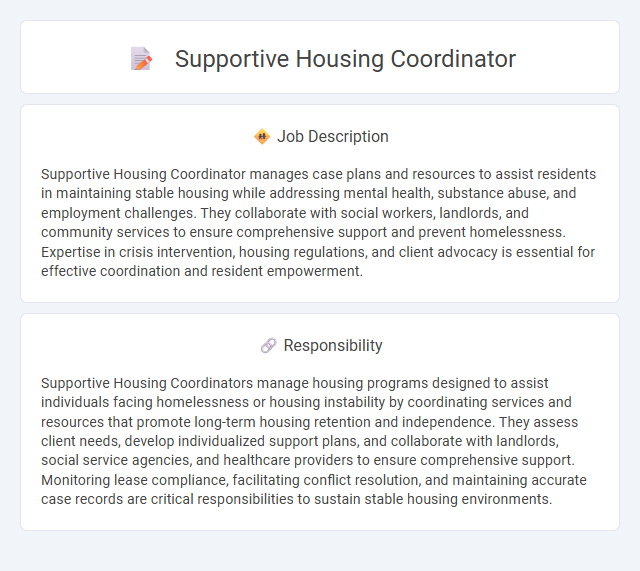
Supportive Housing Coordinator manages case plans and resources to assist residents in maintaining stable housing while addressing mental health, substance abuse, and employment challenges. They collaborate with social workers, landlords, and community services to ensure comprehensive support and prevent homelessness. Expertise in crisis intervention, housing regulations, and client advocacy is essential for effective coordination and resident empowerment.
Individuals experiencing homelessness, mental health challenges, or substance use disorders may be highly suitable for a Supportive Housing Coordinator role, as their lived experience can offer valuable empathy and insight. Those with strong organizational and communication skills could likely manage coordinating services and resources effectively for vulnerable populations. However, people who prefer low-stress environments or struggle with crisis situations might find the demands of this job challenging.
Qualification
A Supportive Housing Coordinator must possess a bachelor's degree in social work, psychology, or a related field, combined with extensive experience in case management and housing services. Strong knowledge of community resources, mental health systems, and tenant rights is essential to effectively coordinate supportive housing programs. Exceptional communication, organizational skills, and the ability to develop individualized service plans further enhance a candidate's qualifications for this role.
Responsibility
Supportive Housing Coordinators manage housing programs designed to assist individuals facing homelessness or housing instability by coordinating services and resources that promote long-term housing retention and independence. They assess client needs, develop individualized support plans, and collaborate with landlords, social service agencies, and healthcare providers to ensure comprehensive support. Monitoring lease compliance, facilitating conflict resolution, and maintaining accurate case records are critical responsibilities to sustain stable housing environments.
Benefit
Supportive Housing Coordinators likely improve tenants' stability and well-being by connecting residents with essential community resources and services. Their role probably enhances coordination between housing providers and health or social service agencies, increasing housing retention rates. Effective coordination may reduce homelessness and boost residents' overall quality of life.
Challenge
The Supportive Housing Coordinator role likely involves managing complex cases where clients face multiple barriers to stable housing, requiring strong problem-solving skills. Coordinators probably encounter challenges in coordinating resources and services effectively across various agencies to meet individual client needs. It is probable that balancing limited funding and high demand adds significant pressure to maintain housing stability for vulnerable populations.
Career Advancement
Supportive Housing Coordinators play a crucial role in managing housing programs that assist vulnerable populations while coordinating services to promote tenant stability and well-being. Career advancement opportunities include progressing to roles such as Program Manager, Housing Director, or Community Development Specialist, where leadership and strategic planning skills are essential. Gaining certifications in social work, housing management, or nonprofit administration can significantly enhance promotion prospects and salary growth in this field.
 kuljobs.com
kuljobs.com